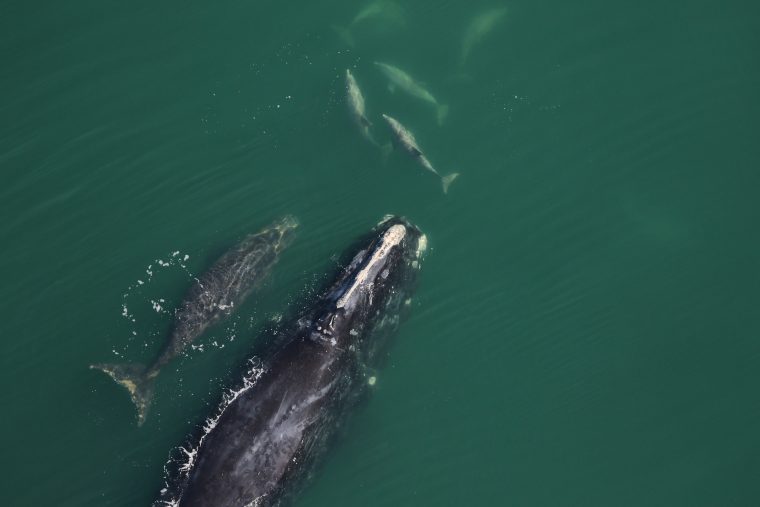The Aquarium will be closed to the public on Wednesday, April 2, for an internal staff event. Regular operating hours will resume on April 3.
Situation illustrates ongoing entanglement risks to critically endangered species, urgent need to accelerate transition to ropeless or “on-demand” fishing gear

BOSTON, MASS. (Jan. 12, 2023) – As the North Atlantic right whale calving season continues this winter, “Spindle” (Catalog #1204), a mother known to be at least 41 years-old, was spotted last weekend in Georgia waters with her 10th known calf, making her the female right whale with the most known calves among the critically endangered species. Indicative of the species’ precarious status, however, researchers also spotted Spindle’s four-year-old unnamed daughter in North Carolina (Catalog #4904) badly entangled in fishing gear.
The duality of Spindle’s story speaks to the plight of North Atlantic right whales as they endure increasing threats from fishing gear entanglements and other stressors, which research has shown is affecting females’ ability to produce calves. Fewer than 350 North Atlantic right whales remain in the population.
“Spindle is a clear example of the species’ mix of hope and threats,” said Philip Hamilton, Senior Scientist and Interim Chair of the Kraus Marine Mammal Conservation Program in the Anderson Cabot Center for Ocean Life at the New England Aquarium. Hamilton tracks the right whales and their individual stories for the North Atlantic Right Whale Catalog. “She is the most productive mother to date, singularly responsible for at least 10 calves in her lifetime, and yet the risk of losing even one of her calves, especially a female, has a big impact for the species overall.”
On Jan. 8, an aerial survey team from Clearwater Marine Aquarium spotted a “heavily entangled” right whale about 20 miles east of Rodanthe, N.C. Scientists at the New England Aquarium identified the whale as Catalog #4904. Line was seen wrapped around her mouth and tail with line trailing behind her, and she had numerous wounds across her body. After viewing the photos, the National Oceanic and Atmospheric Administration (NOAA) determined that this is a serious injury, and she is likely to die. The last known sighting of #4904 was May 2022 in Massachusetts Bay, and she was not entangled at the time. NOAA is determining if a disentanglement response is possible.
“The entanglement and likely death of this young female is even more tragic when you consider that a reproductive female can have more than 20 progeny in her life (calves and all those related to those calves). If she had remained unharmed, #4904 could have increased the population by 6% or more,” Hamilton said.
So far this calving season, 10 North Atlantic right whale mother-calf pairs have been documented, about the same number as this point last year, but those numbers are not enough to sustain the species. In the 2000’s, an average of 23 calves were born each year, but we haven’t seen numbers that high in 14 years. Recently, a North Atlantic right whale neonate, or newborn, just weeks old was seen swimming alone without his mother in sight and later found dead under a pier in Beaufort, N.C.
“We are hoping for many more calves throughout the remainder of the calving season, and that these newborns can make it safely to their feeding grounds up north,” Hamilton said. “Amid ongoing threats from fishing gear entanglement and vessel strikes, right whales are still doing their part by calving year after year, even later in life as in the case of Spindle.”
First seen in 1982, Spindle had her last calf in 2019, following eight previous calves including Vega (Catalog #2904) and Champagne (Catalog #3904). Champagne made Spindle a grandmother in 2021. Fairly fortunate among the species, Spindle has only endured one minor documented entanglement in her long life, but her family members have had 12 known entanglements. Champagne has experienced at least four entanglements with the latest leaving significant scars, and now her daughter #4904 is struggling with ropes through her mouth and wrapped around her tail.
An aerial survey team from Clearwater Marine Aquarium last sighted Spindle off the coast of Georgia on Jan. 7, 2023 with her 10th calf.
The North Atlantic right whales’ critically endangered population has been in decline since 2011, with New England Aquarium research identifying entanglements in fixed fishing gear as the primary cause. More than 86 percent of right whales have been entangled at least once, some as many as nine times. Over the last 40 years, Aquarium scientists have worked with fishermen, industry partners, and government agencies to develop ropeless or “on-demand” gear and weak ropes to find solutions that can protect right whales while allowing the fishing industry to thrive. While advances in ropeless or “on-demand” fishing technology show promise, widespread implementation requires significant financial support from the federal government for the fishing industry to adapt.
MEDIA CONTACT:
Pam Bechtold Snyder – psnyder@neaq.org, 617-686-5068
